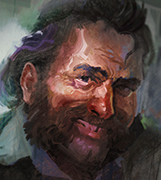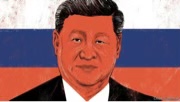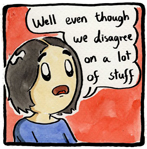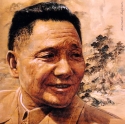|
vyelkin posted:oh, also based on that transcript gradenko posted (I don't listen to podcasts so I can't say anything more in context) it sounds like that guy is mixing up support for the Provisional Government in 1917 with support for the Bolsheviks after 1917, which is a pretty egregious mistake imo. Well, I guess that’s one possible explanation. It definitely makes more sense than hallucinatory fantasies (like France Britain and the US being pro-red), and I’d posit it’s because Duncan is still lib-brained in two key areas: 1. He thinks people should always follow the rules. Seizing power without following the rules and doing it ‘the right way’ is wrong. The Bolsheviks were illegitimate (or at least lacked the moral high ground) because they opportunistically seized power and said gently caress the rules. It’s part of the same idealism he still has about the American revolution and Lafayette- who cares if they made things worse for the common man, they were good people trying to follow the rules of a gentleman. He’s still a White Moderate at heart. 2. He still seems very sympathetic to western and revisionist takes on established history. If the podcast somehow kept going, he’d definitely be sharing reports of the mean soviets killing poor innocent kulaks, Stalin starving Ukraine for shits and giggles, the evil purges killing all the good leaders in the USSR, Trotsky and the Mensheviks being wronged and betrayed idealists, etc. Maybe he’d say some of those things are disputed, or just use sources that lean in that direction, but the sources he’s been using seem like dogshit. I don’t know, maybe I’ll eventually go back and finish listening to the series, but it’s just exhausting having what seems like every single event spun as “bolsheviks bad Lenin bad”. in other words: yeah dunc’s still got a head full of cold war brainworms about the USSR
|
|
|
|

|
| # ? Jun 1, 2024 06:41 |
|
oh and thanks for posting the transcript gradenko, much appreciated
|
|
|
|
maybe the west would have committed more against the soviets if they weren’t also up to similar things in Ireland, turkey, Egypt, Hungary…
|
|
|
|
birdstrike posted:maybe the west would have committed more against the soviets if they weren’t also up to similar things in Ireland, turkey, Egypt, Hungary… they just blew through millions of people fighting their cousins in belgium; one would think they could have at least put in a lil more effort to stop an actual threat to their hegemony lol kinda wonder what happens if lenin is just shot on the way from switzerland to sweden
|
|
|
|
SexyBlindfold posted:Is there a term for when something drives you mildly leftwards? Scooted over? crack pong
|
|
|
|
I read Baron Wrangel's memoir about 13 years ago and all I remember is his contention that the Whites lost because they were assholes who just wouldn't offer people anything. My summation of his very long argument is "We sucked. We just really, really sucked."
|
|
|
|
duncan may have evolved in his politics somewhat from first podcasts, but he's still as pig poo poo stupid as he ever was
|
|
|
|
Teriyaki Hairpiece posted:I read Baron Wrangel's memoir about 13 years ago and all I remember is his contention that the Whites lost because they were assholes who just wouldn't offer people anything. My summation of his very long argument is "We sucked. We just really, really sucked." this was certainly a factor in lack of popular support for the Whites. Not every Russian wanted the Bolsheviks to run the country, but they were offering popular things like land reform, or, more realistically, legitimizing the ad hoc land reform the peasants had already done by themselves, while the Whites offered things like "we take your land back and give it back to the landlords that you hate" and "we restore the monarchy who you hate" and those weren't exactly winning messages.
|
|
|
|
vyelkin posted:this was certainly a factor in lack of popular support for the Whites. Not every Russian wanted the Bolsheviks to run the country, but they were offering popular things like land reform, or, more realistically, legitimizing the ad hoc land reform the peasants had already done by themselves, while the Whites offered things like "we take your land back and give it back to the landlords that you hate" and "we restore the monarchy who you hate" and those weren't exactly winning messages. wh...where was the moderate opposition???
|
|
|
|
i say swears online posted:wh...where was the moderate opposition??? Being shot at.
|
|
|
|
well well well, look what i found https://winstonchurchill.org/publications/finest-hour/finest-hour-147/coalition-foiled-1918/ quote:That night Lloyd George dined with the newspaper proprietor Sir George Riddell, who wrote in his diary that Lloyd George told him: “Winston…wants to conduct a war against the Bolsheviks. That would cause a revolution. Our people would not permit it.”10
|
|
|
|
Teriyaki Hairpiece posted:I read Baron Wrangel's memoir about 13 years ago and all I remember is his contention that the Whites lost because they were assholes who just wouldn't offer people anything. My summation of his very long argument is "We sucked. We just really, really sucked." This is a key component of the brainworms of declining empires. Just the utter refusal to give the people that ostensibly form your power base even the barest minimum of scraps. And then meeting any appeals or protestations about this with increasingly brutal violence.
|
|
|
|
they should be proud to sacrifice for a great empire like ours, much like i, count Inbred von Richenfield have over the years
|
|
|
|
V. Illych L. posted:they should be proud to sacrifice for a great empire like ours, much like i, count Inbred von Richenfield have over the years yeah i actually think this exchange/conflict is interesting because it's a microcosm of the larger liberal/tory political scene at the time. lloyd george and churchill hated each other and had very, very different childhoods. i feel like had churchill been tsar he'd have ended up at the ipatiev house all the same
|
|
|
|
When I started listening to mike duncan on the russian revolution, I only had a vague idea on how it all went down. Now after catching up I'm basically all in on Lenin was right all the time team. I was honestly surprised the bolsheviks were the only party that seemed to actually want a socialist revolution. I figured there would more socialist parties that fought each other to become the face of the revolution but it was just the bolsheviks. Shout outs to the Left Sr for trying to do a coup because they believed jumping back into ww1 is a popular policy.
|
|
|
|
|
the thing that sticks out to me is that their demands were really quite mild and anodyne. We're all familiar with, "peace, land, and bread", but check this out:quote:In August [1915], the majority of deputies in the Duma, excluding only the extremes of Right and Left, formed what they called the Progressive Bloc (Progressivnyi blok), which endorsed Jewish rights, though on a gradual basis. The need to address this question was recognized even on the Right. Pavel Krupenskii, a deputy from the Nationalist Center representing Bessarabia, declared: “I am a congenital anti-Semite, but I have come to the conclusion that it is now necessary for the good of the homeland to make concession to the Jews. We need the support of the Allies. One cannot deny that the Jews are a great international power and that our hostile policy toward them weakens our credit abroad.”
|
|
|
|
Polgas posted:When I started listening to mike duncan on the russian revolution, I only had a vague idea on how it all went down. Now after catching up I'm basically all in on Lenin was right all the time team. I was honestly surprised the bolsheviks were the only party that seemed to actually want a socialist revolution. One thing to remember is that Russia was a very underdeveloped economy at the time, and there were serious ideological disagreements among Russian socialists about what stage of history Russia was at, and therefore whether or not a socialist revolution was even possible. The short version is that the Bolsheviks were the only ones who thought Russia already had developed enough capitalism to become socialist, and the Mensheviks and SRs thought that Russia had only just become a capitalist country and had to go through a stage of capitalist development before it could transition to socialism. This arose from disagreements over Russian history and over the nature of the Russian economy and the 1917 revolution itself. Everybody agreed that Russia had to undergo the classic Marxist teleology of feudalism -> capitalism -> socialism, but Lenin thought that the transition from feudalism to capitalism had already been completed earlier in Russian history, starting with the emancipation of the serfs in 1861, continuing with the urbanization and industrialization of the late nineteenth and early twentieth centuries, and finishing with the 1905 Revolution, which established a limited parliament dominated by bourgeois and conservative parties. Russia had therefore been in the capitalist stage of development, with the existence of an industrial proletariat in the cities but the bourgeoisie in the ascendancy politically and economically, since at least 1905, and could therefore be open to a transition to socialism. The others disagreed, thinking that Russia remained a feudal country during all of that thanks to the predominance of agriculture, the political control of a conservative landowning aristocracy and an absolute monarchy, and the relative weakness of Russia's emerging capitalist economy compared to the traditional agrarian one. In this interpretation, the February Revolution was Russia's bourgeois revolution that finally overthrew feudalism, put the bourgeoisie in charge instead of the aristocracy, and would inaugurate Russia's capitalist stage of history, and so you couldn't say that Russia was ready for a transition to socialism since it had only just become a capitalist country. These two differing interpretations were underlying (thought not exclusive) motives for the dramatically different courses of action these groups took in 1917. Lenin, from the beginning, saw 1917 as Russia's chance for a socialist revolution and so refused any cooperation with the bourgeois Provisional Government in favour of preparation and agitation for a revolution led by the Soviets. The other Russian socialists, in stark contrast, were willing to tolerate a bourgeois government running the country because they thought that was a necessary part of Russia entering the capitalist stage of development, and they thought their role was basically to serve as a check on the bourgeoisie's power during that stage of history, blunting capitalism's worst edges, constraining how much power the bourgeoisie could consolidate, and preparing the country for a future transition to socialism once it had gone through an accelerated period of capitalist growth. As a result, they were happy to (at first) cede the leading roles in the government to representatives from bourgeois liberal parties, as long as the socialists in the Soviet had de facto veto power over what those liberals actually did in office. So yes, Lenin was the only one really agitating for a socialist party and being the socialist face of the revolution, but that was rooted in a deeper-lying argument over Marxist interpretations of where Russia was at in history, whether it was a capitalist country that could therefore transition to socialism or whether it had only just transitioned from feudalism and therefore had to go through capitalism first.
|
|
|
|
there is an interesting conumdrum at the core of contemporary politics that has received quite a lot attention but is, I believe, still somewhat underestimated: the effectiveness of political propaganda and framing even when such propaganda is proven be completely unrealistic. if we were to transport the Progressive Bloc and Goremykin to modern day congress, you'd see Goremykin promising the most spectacular measures to deal with anti-semitism. He'd hold speeches highlighting the fundamental wrongness of anti-semitism, project himself as the paragon of the Jewish people and their rights etc. When these initiatives inevitably fail, and the propaganda is proven to be false, nothing would happen, the propaganda would keep its propagandistic-value and the electorate would not fundamentally change its views of Goremykin. Many have identified the corrupt media-political complex and the massive use of psychoanalytical measures in advertising as important factors in realising such a gap between the pseudo-reality of propaganda, and the actual social-political Real, but I think the problem is even more fundamental: it is the subject itself, that has fallen completely for a make-believe conception of the Political, unable to escape. Perhaps it is capitalist realism or Zizekian ideology that have corrupted and captured the subject, or it is the subject itself that has changed.
|
|
|
|
gradenko_2000 posted:the thing that sticks out to me is that their demands were really quite mild and anodyne. We're all familiar with, "peace, land, and bread", but check this out: What did Nicky do to the jews?
|
|
|
|
Tankbuster posted:What did Nicky do to the jews? He deported huge numbers of them from the border areas because it was believed that they would act as spies for the Germans and Austro-Hungarians if allowed to stay where they were, but it was a straight expulsion with no real destination or aid so large numbers of them died from exposure, starvation, disease, and violence by people whose anti-semitism was only reinforced by the mere deportation in the first place (when I say "he" did this, this was mostly done by his reactionary cabinet and generals, but of course command responsibility applies)
|
|
|
|
I sorta understood the divide between socialist revolution now and lets help the bourgeois revolution but when the moderate socialist started bleeding support I was just surprised that they still refused to course correct.
|
|
|
|
|
drat thats hosed up.
|
|
|
|
Tankbuster posted:What did Nicky do to the jews? In addition to what gradenko posted about the war years, it's worth considering how Nicholas and Russia's reactionaries treated Jews before the war. Sergei Podbolotov, "'True Russians' Against the Jews: Right-Wing Anti-Semitism in the Last Years of the Russian Empire, 1905-1917, Ab Imperio no. 3 (2001), 205-206 posted:Everywhere anti-Semites, despite of their often loud agitation, offered very little in a sense of practical solutions. In Russia the Right enjoyed a sympathy of the almost unlimited ruler, the Sovereign himself. Nicholas II had a benevolent character, but his worldview was well suited for acceptance of anti-Semitism. His rejection of modernisation, his mysticism, his confusion about the real world, his application of moral values to his allies and enemies (e.g. when the first belonged to “the good” and the latter to “the nasty”), his nationalism (e.g. when allies to autocracy were defined as “true Russians”) – all these traits led Nicholas II to the conclusion that opponents to his unlimited power were mostly “Yids”, as the tsar almost invariably and despicably called his Jewish subjects. It cannot be said that the emperor intentionally fomented anti-Semitism as a deliberate policy to direct popular discontent against a chosen scapegoats. If there were “insincere anti-Semites” as perhaps the Vienna mayor Karl Lueger who cynically used anti-Semitic rhetoric to attract certain audiences, then the sincere anti-Semitism of Nicholas II was, on the contrary, an expression of his uncomplicated nature. Nicholas himself was antisemitic but from the point of view of the ruler of a vast multiethnic empire also disliked pogrom violence that caused disorder and ethnic strife. The Russian Empire never considered exterminating Jews like certain other regimes did, though it did undertake other antisemitic actions like trying to frame Jews for blood libel (look up the Beilis Affair for details), and other high-level decisionmakers like Sergei Witte acknowledged that the only feasible future for Russia's Jews was to gradually emancipate them and give them equal civil rights. But Nicholas and others also refused to do that much, in part because they worried that doing so would provoke antisemitic violence from other parts of the population and in part because of their own antisemitism. And in the meantime, well, the reactionary monarchists who were Nicholas's most staunch supporters against socialism, liberalism, and gradual reform in other areas, like the Union of the Russian People (Black Hundreds), were also staunchly antisemitic and frequently commited antisemitic violence, and Nicholas and his government looked upon them favourably for other reasons and gave them political and financial backing even while condemning their antisemitic violence for bringing chaos and disorder with it. Like all history, it's complicated. He was an antisemite, but they were all antisemites, and his antisemitism wasn't strong enough to overlook the dangerous disorder that antisemitic violence brought with it, but also his feelings against antisemitic violence weren't strong enough to be a dealbreaker when his strongest supporters were the ones committing pogroms.
|
|
|
|
Polgas posted:I sorta understood the divide between socialist revolution now and lets help the bourgeois revolution but when the moderate socialist started bleeding support I was just surprised that they still refused to course correct. a few years ago a prominent scholar in the field wrote an article about alternative histories of 1917 and when discussing this one (why didn't the moderate socialists course correct?) his conclusion was basically that if they were the kind of people who could course correct, they wouldn't have been in that situation in the first place.
|
|
|
|
vyelkin posted:this was certainly a factor in lack of popular support for the Whites. Not every Russian wanted the Bolsheviks to run the country, but they were offering popular things like land reform, or, more realistically, legitimizing the ad hoc land reform the peasants had already done by themselves, while the Whites offered things like "we take your land back and give it back to the landlords that you hate" and "we restore the monarchy who you hate" and those weren't exactly winning messages. From what I understand, reading Kotkin's biography of Stalin, (or having read it some years past), the Bolsheviks had next to no support among the peasants precisely because they refused to legitimise the land the peasants had seized in their own unrecognised revolution. The NEP in large part was a compromise where private ownership of land was recognised as practical fact but not in principle. I think much of what you say in terms of land reform was offered by the Social Revolutionaries, "Left" in particular, but explicitly not so by the Bolsheviks because they were against private property. Russia 1917 revolution to the next revolution in 1918 and then is an incredibly tumultous time with much of the fighting being within the left. Like Kerensky is often characterised as a socialist.
|
|
|
|
Grimnarsson posted:From what I understand, reading Kotkin's biography of Stalin, (or having read it some years past), the Bolsheviks had next to no support among the peasants precisely because they refused to legitimise the land the peasants had seized in their own unrecognised revolution. The NEP in large part was a compromise where private ownership of land was recognised as practical fact but not in principle. I think much of what you say in terms of land reform was offered by the Social Revolutionaries, "Left" in particular, but explicitly not so by the Bolsheviks because they were against private property. Russia 1917 revolution to the next revolution in 1918 and then is an incredibly tumultous time with much of the fighting being within the left. Like Kerensky is often characterised as a socialist. Yeah I dunno what Kotkin says in the Stalin biography, but that isn't really true. One of the Bolsheviks' first decrees after the October Revolution was the Decree on Land which abolished private property and legitimized the seizure of landed estates that peasants had already done during 1917 and were currently doing at the time of the Decree (this wasn't private property in the countryside, because the seizures tended to happen at the village level, whether through a commune or through local soviets, unions, land committees, etc. It wasn't just a random peasant taking the landlord's fields and declaring they belonged to him now). It's true that the Bolsheviks didn't have a big following in the countryside - peasants mostly voted for the SRs, which wasn't surprising. The Bolsheviks were predominantly a party of the urban industrial proletariat, which during 1917 also acquired a large following among soldiers. The SRs were predominantly a peasant socialist party, which traced its roots back to the narodniki of the 1870s but with added Marxism. Their leaders were still educated intellectuals, but they thought the peasantry could be a revolutionary class like the urban workers and as a result they actually expended a lot of effort on outreach to the peasantry before and during the revolution, while the Bolsheviks were spending their resources on outreach to workers and soldiers. During the Civil War, even the White governments that had Right SRs in them started promising to return estates to former landowners as a concession to the White officers and right-wingers they were forming coalitions with. The Whites generally ended up with confused and shifting land policies as a result of the fact that they were a loose coalition and that they had to try and win popular support somehow if they were going to win the war. Here's one of the best recent comprehensive histories of the revolution talking about the Whites on the land question: S. A. Smith, Russia in Revolution, 171-2 posted:White officers liked to see themselves as being 'above class' and 'above party'--a familiar trope of Kadet discourse. They sought to keep political differences at bay by avoiding thrashing out detailed political programmes, justifying this in terms of what they rather pretentiously called a principle of 'non-predetermination', that is, the postponement of policy-making until after they had won the civil war. However, faced by opponents who had a detailed social and political agenda, 'non-predetermination' proved to be a non-starter. In the course of 1919, the White administrations were forced to grapple with the thorny issues of land reform, national autonomy, labour policy, and local government. Generally, the policies they concocted proved too little and too late, and laid bare internal divisions. Kolchak's government, more stable and ramified than Denikin's peripatetic Special Conference of the Armed Forces of South Russia, tended to take the lead in policy-making.38 In March 1919 it issued a proposal to allow peasants to rent land from the state; but a month later, not to be outdone, Denikin put forward a plan to bolster peasant smallholding through compulsory expropriation of gentry land, albeit with compensation. However, he was overruled by his Special Conference, which called for the return of all land seized at the time of the Revolution, and insisted that any expropriation could only be considered three years after the end of hostilities. It is true that as the Whites faced the prospect of defeat, their policies became less uncompromising. Wrangel's land reform law of 1920 was fairly progressive, envisaging a land fund created from the compulsory alienation of lands above a certain norm, to which recipients of land would be obliged to give part of their harvest, thus enabling those whose land had been taken gradually to be compensated. Now to be clear that all doesn't mean that the Bolsheviks were hugely popular in the countryside. War communism meant requisitioning food and conscripting peasants which were both highly unpopular. There were even large numbers of peasant uprisings against the Bolsheviks to fight requisitioning and other coercive policies. But when the cards were down, they had advantages over the Whites in that they acknowledged the reality that peasants had taken the land in 1917 and their land reform policies, while not exactly what peasants wanted, were seen as far better among the peasantry than what the Whites were offering. Smith, again: ibid, 180-181 posted:If military and strategic factors were paramount in explaining the defeat of the Whites, socio-political factors were also significant. If the White generals were politically inexperienced, this was hardly true of their right-wing Kadet and monarchist advisers. First, their failure to come up with credible schemes of land reform made them suspect in peasant eyes, and there were enough cases of officers returning former landowners to their estates--for instance Major General Uvarov in Stavropol' in 1918 and the Ufa Directory in 1919--to fix in peasant minds the notion that a White victory would mean the return of the landlords. The Reds certainly did not win because they had mass peasant support: their policies of requisitioning and conscription created intense animosity on the part of the rural population. Nevertheless, they were certainly seen as the lesser of two evils. Indeed it was the willingness of the rural population to swing behind the Bolsheviks whenever a White takeover threatened which meant that so long as the civil war lasted, endemic rural unrest did not pose a serious threat to Bolshevik power. vyelkin has issued a correction as of 23:46 on Feb 18, 2022 |
|
|
|
bill placing an off menu order of the cashier's heaving baps
|
|
|
|
vyelkin posted:Yeah I dunno what Kotkin says in the Stalin biography, but that isn't really true. One of the Bolsheviks' first decrees after the October Revolution was the Decree on Land which abolished private property and legitimized the seizure of landed estates that peasants had already done during 1917 and were currently doing at the time of the Decree (this wasn't private property in the countryside, because the seizures tended to happen at the village level, whether through a commune or through local soviets, unions, land committees, etc. It wasn't just a random peasant taking the landlord's fields and declaring they belonged to him now). It's true that the Bolsheviks didn't have a big following in the countryside - peasants mostly voted for the SRs, which wasn't surprising. The Bolsheviks were predominantly a party of the urban industrial proletariat, which during 1917 also acquired a large following among soldiers. The SRs were predominantly a peasant socialist party, which traced its roots back to the narodniki of the 1870s but with added Marxism. Their leaders were still educated intellectuals, but they thought the peasantry could be a revolutionary class like the urban workers and as a result they actually expended a lot of effort on outreach to the peasantry before and during the revolution, while the Bolsheviks were spending their resources on outreach to workers and soldiers. Everything you say here seems roughly in line what I've read. The peasants seized the lands and in the first elections they voted for those who recognised that which wasn't the bolsheviks because they were against private property. The peasant class all over Europe had been an ally for social revolution until they were allowed to own their own plots of land. Then they transformed into a bulwark against social change. That is what the Bolsheviks feared, with their few million workers against a hundred million peasants.
|
|
|
|
Grimnarsson posted:Everything you say here seems roughly in line what I've read. The peasants seized the lands and in the first elections they voted for those who recognised that which wasn't the bolsheviks because they were against private property. The right SRs also weren’t that interested in a dramatic social revolution either, they wanted their villages to keep their land but they weren’t that interested otherwise in the things they were pushing. That said, you really couldn’t organize a government around that and the SR was always historically pretty divided and the Bolsheviks clearly knew they had to push their way forward but the election results weren’t going to lead anyway productive.
|
|
|
|
Terrible Opinions posted:Haven't gotten the episode in question but given how he talked about them before Duncan is probably referring to the Provisional Government in that statement, he has pretty consistently referred to the Provisional Government as socialists in episodes I've reached. Vyelkin is more or less the same as Duncan's episodes 64-79. Nope, after the civil war breaks out he very clearly delineates between the Bolshevik "reds" and the other socialists "whites"
|
|
|
|
https://billypenn.com/2020/03/07/from-horses-to-trolleys-how-philly-bus-routes-got-their-names/ Really interesting article about Philly transit routes. Also Philly is the place where the coordinate system for addresses started. Like you can say 2412 blank street and sort of know where that would be located generally. That started in Philadelphia.
|
|
|
|
Dreddout posted:Nope, after the civil war breaks out he very clearly delineates between the Bolshevik "reds" and the other socialists "whites"
|
|
|
|
sad that I missed the bulk of Mike Duncan chat, I'm always up to talk about the ways that he sucks. he's undeniably Shifted Left over the course of doing his podcast but that shift started from a place where he devoted an entire episode of the podcast to reciting the US Bill of Rights because it made him so emotional and he thought it was such a powerful piece of writing, and then in the French Revolution series he endorsed Alexis de Tocqueville's views on the Revolution (that the reforms would have happened gradually under the monarchy anyway, and the revolutionaries undermined everything with violence) and even when he was 'radicalising' during the Haitian series (which I went back to listen to after giving up during the French Revolution one, because I kept hearing how his viewpoint was shifting) he spent half the time shilling for the hagiography of Lafayette that he was about to publish
|
|
|
|
isn’t his original thesis (from ep1 or 2 or so) that despite the revolutions the same people end up in charge? which is about most stupidly reductive reading of the english and french revs and not much else. my own reductive take is that foreign conservative intervention makes things worse for everyone, which I can apply to more than 2 revolutions please subscribe to my podcast
|
|
|
|
i think mike duncan is fine as a layman's historian who makes a podcast that i can listen to while i sit on a rower for 30 minutes at 530 in the morning. at the very least he's better than dan carlin. his writing is dreadful, however. his style really doesn't translate to book form
|
|
|
|
FizFashizzle posted:i think mike duncan is fine as a layman's historian who makes a podcast that i can listen to while i sit on a rower for 30 minutes at 530 in the morning. at the very least he's better than dan carlin. *boxing analogy* END QUOTE
|
|
|
|
To anyone interested in postcolonial African history itt: can you recommend any good texts about the 1964 Zanzibar Revolution? Thanks in advance.
|
|
|
|
Pardon if this was asked or mentioned earlier, but what's good further reading on the Russian revolution/civil war/bolshevik history/etc. that would be useful for people listening to the Revolutions podcast?
|
|
|
|
FizFashizzle posted:i think mike duncan is fine as a layman's historian who makes a podcast that i can listen to while i sit on a rower for 30 minutes at 530 in the morning. at the very least he's better than dan carlin. dan carlin's hard r history
|
|
|
|

|
| # ? Jun 1, 2024 06:41 |
|
Takanago posted:Pardon if this was asked or mentioned earlier, but what's good further reading on the Russian revolution/civil war/bolshevik history/etc. that would be useful for people listening to the Revolutions podcast? Can't answer based on the podcast, but there were a bunch of centenary survey histories of the revolution that were published in 2017 and for the most part they're quite good. I like Mark Steinberg's The Russian Revolution 1905-21 and S. A. Smith's Russia in Revolution, other people I know like Laura Engelstein's Russia in Flames. Ronald Grigor Suny's Red Flag Unfurled might also be good but I haven't read it myself. If you just want a good narrative of 1917 in Petrograd, you might enjoy China Mieville's October. Just avoid Sean McMeekin's The Russian Revolution because it's junk.
|
|
|








































